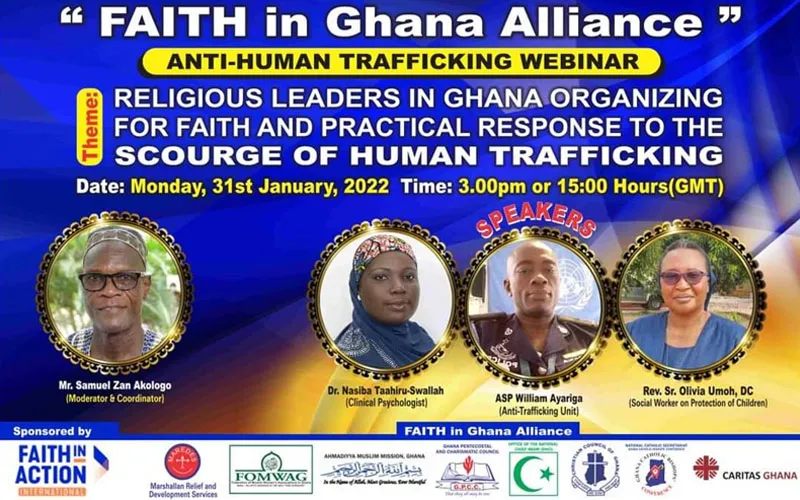At the event, Ghana’s Deputy Director of Anti-Trafficking Unit at the Criminal Investigation Department, William Ayaraga, said investigators looked into 137 cases of human trafficking in 2019.
Mr. Ayaraga further noted that the West African nation is a source, transit and destination of men, women and children subjected to human trafficking.
To fight human trafficking, he said faith leaders ought to support anti-trafficking agencies.
“Faith Baith Organizations (FBOs) can provide shelter for victims where they can undergo some training before they are reintegrated to society,” Mr. Ayaraga said, adding, “Church members can offer expertise such as medical support, legal support, trauma care, counselling to victims.”
Together, law enforcement agencies and FBOs will help facilitate victims’ recovery, reintegration and criminal prosecution, he emphasized.
(Story continues below)
During the Webinar, Dr. Nasiba Taahiru-Swallah, a clinical psychologist, said trafficking goes against Islam which emphasizes respect for human rights.
“Islam places the highest value on humanity and the Quran emphasizes this. There is no tolerance for any form of human trafficking. Islam does not tolerate human trafficking,” said Dr. Swallah.
She added that human rights in Islam is the obligation of every Muslim, government and organs of society to implement within the framework of order.
In her presentation, the Muslim faithful noted that human trafficking has been ingrained in the Ghanaian culture.
“Parents have sent children to live with extended family members in order to establish family ties and boost their children’s educational or skills development. Children living with relatives are frequently exploited for labor, domestic services, and stopped from schooling,” Dr. Swallah said.
The clinical psychologist added that poverty has also forced many Ghanaian youths to seek for jobs away from their hometowns, a factor that places them at risk of being trafficked.
As a way forward, she said faith-based leaders have to be at the forefront in combating human trafficking.
“We can use our pulpit to influence and preach against human trafficking,” the clinical psychologist said, adding that religious leaders can lobby and mobilize support to strengthen prevention of human trafficking through their respective institutions.
“Collaboration is important in combating this menace. Trafficking leaves both visible and invisible scars. To combat trafficking, psychologists, policy makers, and religious leaders must collaborate,” Dr. Swallah said.
Last year, religious leaders drawn from Ghana, the Democratic Republic of Congo (DRC), Nigeria, and Ivory Coast jointly declared to use their influence in society to end human trafficking.
Secretary General of GCBC, Fr. Lazarus Anondee, who participated in the signing of the "Joint Declaration of Religious Leaders Against Modern Slavery” said human trafficking is "a particularly heinous crime, as it involves the exploitation and abuse of people for the purpose of gaining profit."
The Declaration was an initiative of the of the Global Freedom Network of the human rights organization, Walk Free, which advocates a faster end to the crime of human trafficking that affects more than 40 million people worldwide.
Magdalene Kahiu is a Kenyan journalist with passion in Church communication. She holds a Degree in Social Communications from the Catholic University of Eastern Africa (CUEA). Currently, she works as a journalist for ACI Africa.








